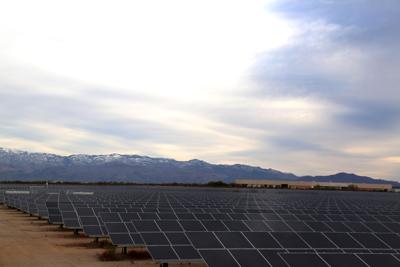UA wins funding to support renewable energy innovation

The Solar Zone at the University of Arizona Tech Park in Tucson, Ariz. on Jan. 29, 2021.
The University of Arizona Center for Innovation recently received an award of up to $300,000 from the National Renewable Energy Laboratory to support the U.S. technology innovators competing in the Department of Energy’s American-Made Challenges program.
NREL granted this award to UACI after their successful collaboration on the American-Made Solar Prize Challenge — an ongoing $3 million prize competition designed to increase the capabilities of American companies to manufacture efficient new solar technologies.
“We have a pretty successful track record in serving innovators,” said UACI executive director Eric Smith. “We understand the startup around the technology, and we understand how to bring things to market.”
The Center for Innovation is the longest continuously running incubator in the state of Arizona. For almost two decades, they’ve helped grow a variety of science and technology startups from around the nation by offering the guidance, resources and network connections they need to turn their ideas and inventions into self-sustaining businesses. Smith explained that when startups are successful, they can fuel economic development in Southern Arizona.
UACI will now be offering their services as an incubator to startups competing in four separate American-Made Challenges, all focused on different areas of energy innovation and domestic manufacturing. American-Made Challenges is a program run by DOE and NREL that incentivizes entrepreneurs in domestic energy solutions through funding and networking.
With the new award, UACI will be supporting teams competing for the Groundbreaking Hydro Prize, the Ocean Observing Prize, and the Geothermal Manufacturing Prize. UACI is one of only eight organizations in the country now managing the American-Made Challenge program in its entirety.
While the most recent American-Made Challenges are still in their early stages with deadlines for entry fast approaching, the American-Made Solar Prize Challenge is in full swing. The competition has three phases: Ready!, Set! and Go!.
At each different phase, the number of competitors shrinks and the amount of money going to the contestants increases significantly.
The American-Made Solar Prize Challenge recently completed its “Ready!” phase and will now be moving into the “Set!” phase with only 20 remaining competitors. UACI is supporting eight out of the 20 teams moving into the next phase.
One of the semifinalists taking advantage of UACI’s incubator services for the competition is SolaBlock — a Massachusetts-based startup focused on addressing the need for vertical solar infrastructure. Their submission is a concrete block that links conventional building materials with solar materials. When connected, the blocks create a solar wall system that provides insulation and electricity.
“UACI has given us the ability to have a direct line into resources that we would have never had access to,” said Scott Longley, the Chief Supply Chain Officer at SolaBlock. “I do not think we would be anywhere near where we are now if it wasn’t for the help of UACI.”
The center offers similar support to the team at Navia Energy, another startup moving into the “Set!” phase of the Solar Prize Challenge. Navia Energy is in the process of developing an AI enabled battery-less Solar grid Hybrid Inverter, a technology that can eliminate some of the major limitations of currently installed solar systems. Their inverters would allow buildings to continue to receive uninterrupted power even when their central grid is turned off.
SolaBlock and Navia Enegry are just two of many environmentally conscious companies being supported by the UACI. The UACI has offered their services to companies seeking to address a wide array of environmental issues ranging from food security to mine tailings to solar
efficiency.
Solar energy startups in particular remain a core focus of UACI due to its relationship with the Solar Zone, one of the country’s largest testing and demonstration sites for solar technologies located at the UA Tech Park.
With regard to the technologies being produced for the American-Made Challenges, Smith explained that the best is yet to come. Startups tend to take a few years before they can make a major impact. In the meantime, UACI is committed to supporting NREL and the DOE in their mission to strengthen American leadership in energy
innovation.
“Startups exist to solve real-world problems for the market,” Smith said. “In the clean energy space, there’s a lot that we can solve for. In the context of the American-Made Challenges, it’s important to do this here in the United States as best we can to continue to improve our standing in the world.”
The UACI is part of Tech Parks Arizona, which brings together university, industry and community, creating “interactive ground” to advance technology innovation. The National Renewable Energy Laboratory advances the science and engineering of energy efficiency, sustainable transportation, and renewable power technologies and provides the knowledge to integrate and optimize energy systems. The American-Made Challenges program is directed and administered by NREL and funded by the U.S. Department of Energy.
Madison Beal is an Inside Tucson Business intern from the UA School of Journalism.
Read the Original Tucson Local Media Article by Madison Beal Here















